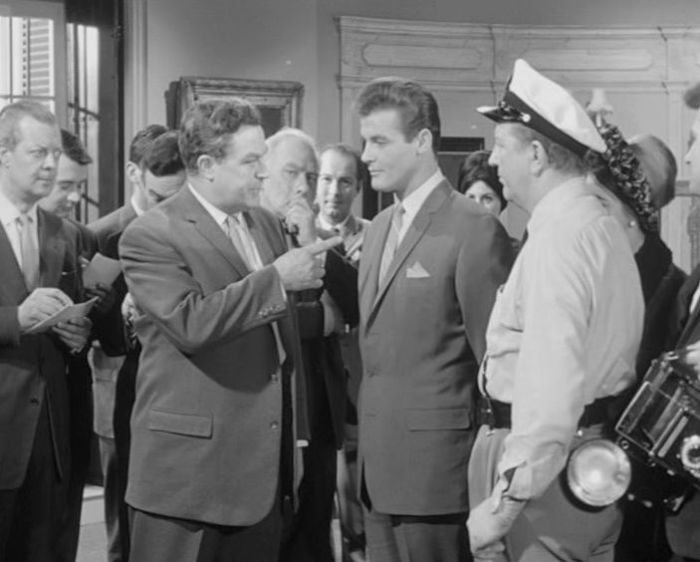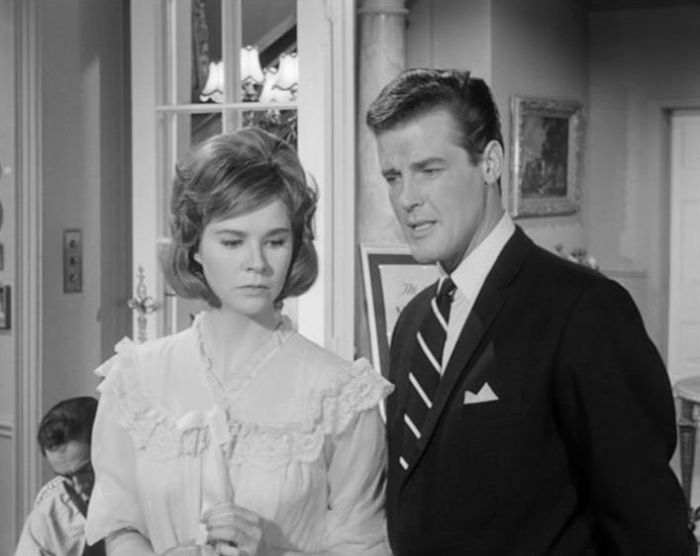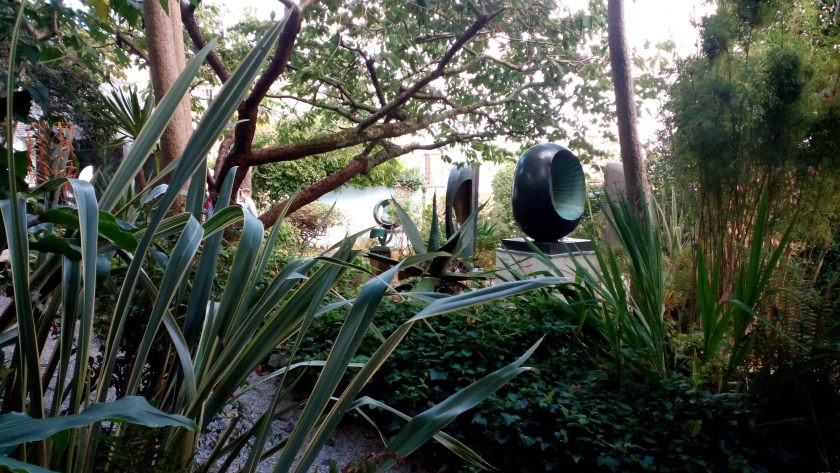
Having had a successful evening in a Monte Carlo casino, Simon is in the process of cashing in his chips when he bumps into an old friend, Bill Fulton (Gary Cockrell). Bill’s feeling depressed because the millionaire father of his sweetheart, Meryl (Suzanne Neve), has forbidden their union. Meryl’s father, Elliot Vascoe (John Barrie), has an impressive art collection and the Saint – aiming to teach him a lesson – bets him five thousand dollars that sometime during the next four days his new gallery will be robbed.
Simon’s in full James Bond mode at the start of the episode. He’s looking suitably dashing in a white tuxedo and – like Bond – is the sort of gambler who knows when to stop. His taste for stylish casualwear can be seen later on when he relaxes in an impressive dressing gown.
Bill’s a penniless musician which means that in Vascoe’s eyes he couldn’t be a worse match for his daughter. And then there’s the instrument he plays. “A drummer! Not even a real musician, he just makes a noise”. Needless to say, Meryl doesn’t take this sort of criticism very well – it just serves to drive a wedge between her and her father.
Suzanne Neve is rather lovely, although unlike some of the other ladies who cross paths with the Saint, Meryl carries herself with a more natural air. Amongst her later credits, Neve would appear in The Forsyth Saga (1967) as well as popping up twice in UFO as Ed Straker’s bitter and estranged ex-wife Mary.
Simon’s baiting of Vascoe might be partly motivated by the travails of Bill and Meryl, but he’s also doing it because he despises Vascoe (they’ve clashed before). Vascoe is the sort of character who simply rubs Simon up the wrong way – he tags him as a nouveau riche philistine, someone who doesn’t appreciate art (he simply delights in buying up various treasures in order to demonstrate that he’s “cultured”).
John Barrie racked up sixty six episodes of Sergeant Cork during the 1960’s. Amazingly, all of the episodes exist and are now available on DVD – if you haven’t seen them then you really should (advert over). It’s mainly thanks to Cork that Barrie has become a favourite actor of mine – meaning that it’s a treat to see him pop up in this episode. Vascoe is not the most multi-layered of characters – he’s an arrogant type who you know is going to be taken down a peg or two – but thanks to Barrie’s performance he’s never less than completely watchable.
Another familiar face appearing is Rachel Gurney as Delphine Chambers. Delphine has been commissioned by Vascoe to paint a portrait of Meryl, which gives her the opportunity to linger around the perimeters of the plot. Other highly recognisable actors passing by include Ivor Salter as a typically inefficient policemen (just one of a number drafted in to keep tabs on Simon) and Andre Maranne as a radio operator.
Arnold Diamond, as Colonel Latignant, may be one of Simon’s lesser-known authority adversaries, but since he appeared in six episodes he possibly deserves to be more appreciated. Latignant is tasked to stop the Saint (who of course runs rings around him with insouciant ease). This means that at one point the unfortunate Latignant buries his head in his hands and lets out a primal scream of anguish!
Simon’s public pronouncement has drawn a veritable rogues gallery to Monte Carlo – all of them keen to attempt the burglary, since they know that if they succeed then Simon will be blamed. Jules Brant (Raymond Adamson) is the one who actually carries out the crime, although Simon is on hand to intercept him and give him a decent duffing up. It’s a nice touch that Brant left the Saint’s calling card (the stickman figure) at the scene of the crime – this was something that the literary Saint tended to do in his early days.
Simon’s parting shot to Vascoe – he returns the stolen items and explains that any one of his trusted friends and advisors could have been the inside man since they all despise him – is devastating. The television Saint has rarely been as ruthless as this, although since his actions do serve as a wakeup call for Vascoe, it’s not entirely vindictive. This is easily Barrie’s best scene, as we see Vascoe slowly realise that whilst his life is materially rich it’s also emotionally barren. We end on an optimistic note as Vascoe and Meryl are reconciled.
Given that it shares a few plot similarities, it’s not too surprising that this story was originally published in the same collection as The Charitable Countess (The Happy Highwayman, 1939). Charteris’ story is set in New York rather than Monte Carlo and although Vascoe is blocking Meryl and Bill’s marriage, it’s for a very different reason. In the short story, Bill has invented a new tube(!) that’s set to make him a fortune – but since grasping old Vascoe lent him the money to develop it, he’s now planning to foreclose on the loan and reap the rewards of Bill’s invention for himself. The identity of the thief is also quite different and Vascoe remains unrepentant at the end. Given that the story is pretty short, it’s not too surprising that the teleplay had to be bulked out somewhat.
Another typically strong guest cast – headed by the peerless John Barrie – ensures that this is another top quality Saint episode. Four and a half halos out of five.






